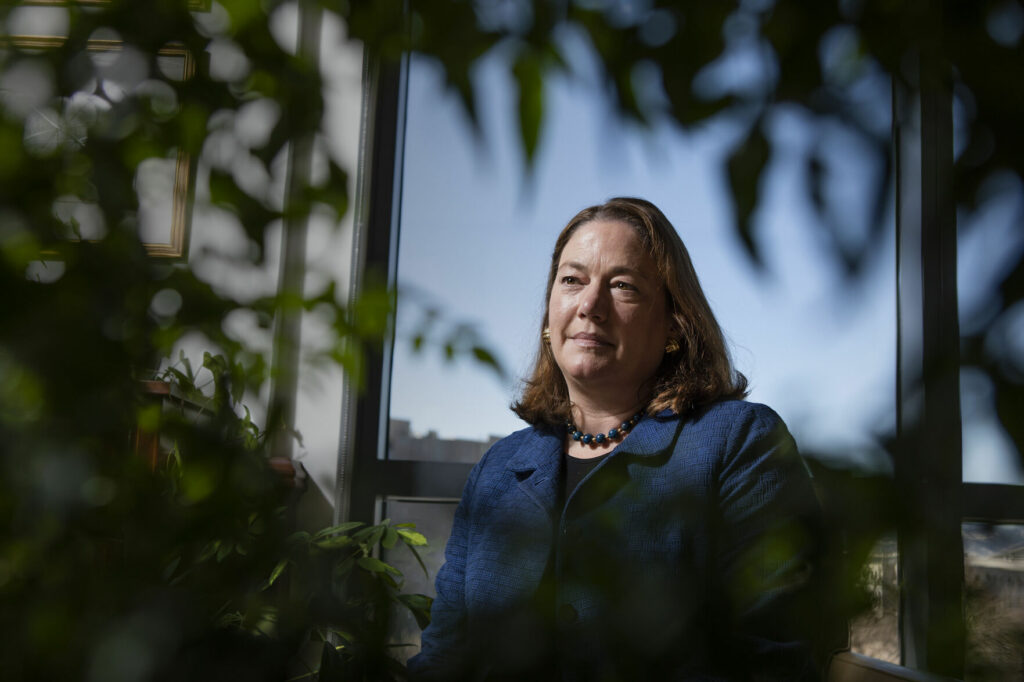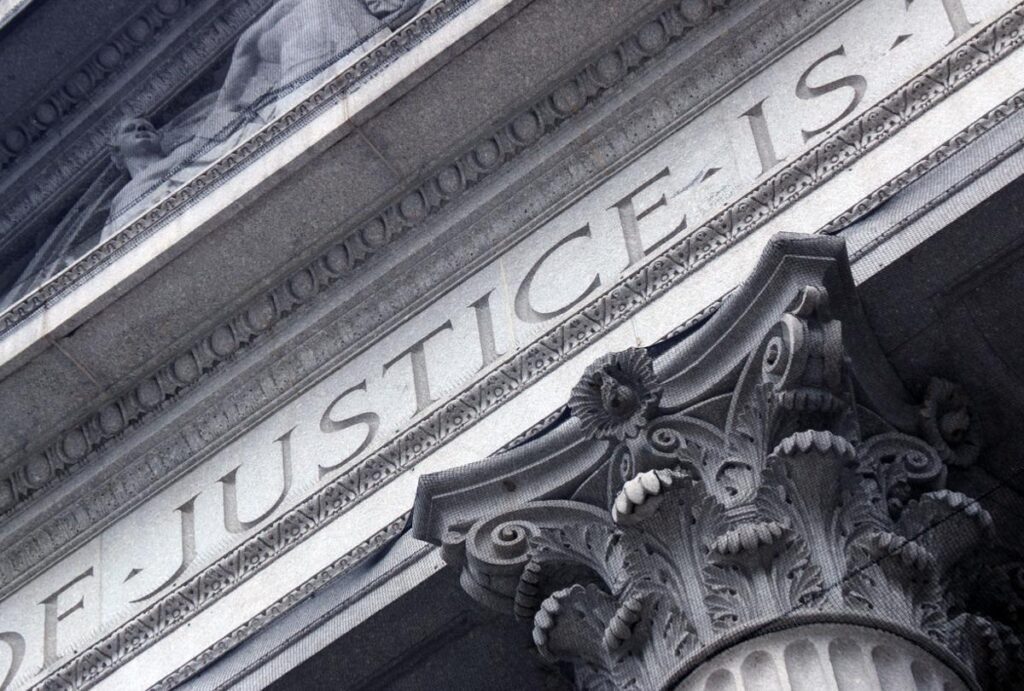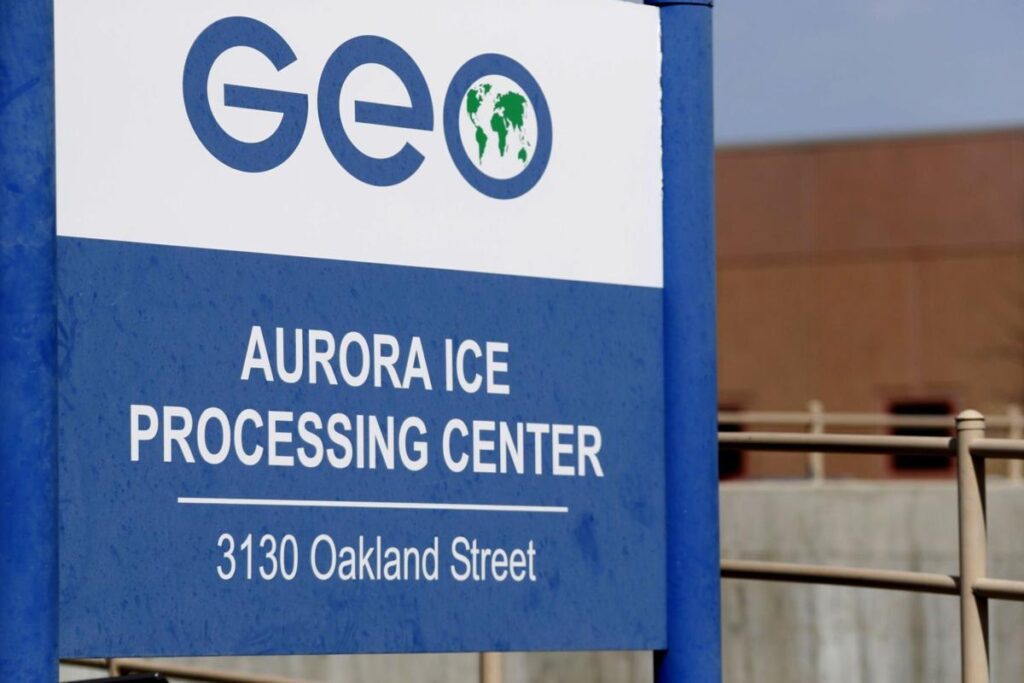Colorado Supreme Court signals intervention in Denver, Jeffco criminal cases
RklMRSBQSE9UTzogU3R1ZGVudHMgZnJvbSBQaW5lIENyZWVrIEhpZ2ggU2Nob29sIGFzayB0aGUganVzdGljZXMgb2YgdGhlIENvbG9yYWRvIFN1cHJlbWUgQ291cnQgcXVlc3Rpb25zIGFmdGVyIHdhdGNoaW5nIHRoZW0gaGVhciBhcmd1bWVudHMgZnJvbSB0d28gY2FzZXMgaW4gdGhlIGhpZ2ggc2Nob29sIGF1ZGl0b3JpdW0gb24gTm92LCAxNywgMjAyMi4gUGljdHVyZWQgZnJvbSBsZWZ0IHRvIHJpZ2h0IGFyZSBKdXN0aWNlIFJpY2hhcmQgTC4gR2FicmllbCwgSnVzdGljZSBNb25pY2EgTS4gTcOhcnF1ZXosIENoaWVmIEp1c3RpY2UgQnJpYW4gRC4gQm9hdHJpZ2h0LCBKdXN0aWNlIFdpbGxpYW0gVy4gSG9vZCBJSUkgYW5kIEp1c3RpY2UgTWVsaXNzYSBIYXJ0Lg==
UGFya2VyIFNlaWJvbGQvVGhlIEdhemV0dGU=
The Colorado Supreme Court indicated in recent weeks that it may intervene in two criminal cases to decide whether a defendant convicted of a misdemeanor in county court is entitled to halt his sentence while he appeals, and whether prosecutors established probable cause of another defendant’s child abuse charge.
At least three of the court’s seven members must agree to hear a case on appeal. In instances where a party seeks the Supreme Court’s intervention directly from the trial courts, the votes of four justices are required.
In November 2023, a jury in Denver County Court found Richard Lewis guilty of multiple misdemeanors for sexual assault. He received 12 months in the county jail plus five years of sex offender probation as a sentence.
Before trial, Lewis had been out on a personal recognizance bond. At sentencing, Lewis indicated he would appeal his convictions and asked to remain free on bond until a district court judge could review the case.
In response, Presiding Judge Kerri Lombardi cited Colorado’s law governing bail pending appeal. In instances where bail is allowed, a judge can decline to let the defendant remain free if they are likely to flee, pose a danger to the community or the appeal would be frivolous.
Lombardi said she had “significant concerns about the safety of the community,” and also believed any appeal would be frivolous. She declined to allow Lewis to remain free until the conclusion of his appeal.
Lewis turned directly to the Supreme Court. He contended the law permitting judges to deny bail pending appeal did not apply to county courts. Further, a different law explicitly requires county court judges to grant bail pending appeal upon request.
Finally, Lewis argued Lombardi violated the Supreme Court’s own precedent. He pointed to a 2014 decision, People v. Steen, in which a Boulder County District Court judge — now-Justice Maria E. Berkenkotter — declined to pause the defendant’s probationary sentence while she reviewed the appeal of his county court conviction.
The Supreme Court’s majority at the time noted criminal defendants have the right to appeal, but appealing a misdemeanor conviction from a county court would be meaningless if defendants had to start serving their brief sentences right away.
“Given the length of time required to obtain a judgment on appeal, county court defendants are at a greater risk of completing all, or most, of their sentences before an appellate judgment has been reached by the district court,” wrote Justice Monica M. Márquez. “Our decision today ensures that, upon request, a county court will grant a stay of execution to a defendant, thus removing the specter of a useless appeal.”
On March 22, the Supreme Court directed the prosecution and Lombardi to respond to Lewis’ petition for relief.
The case is People v. Lewis.

FILE PHOTO: Colorado Supreme Court Justices Richard L. Gabriel, left, Monica M. Márquez, center, and Chief Justice Brian D. Boatright, right, listen to an argument during a Courts in the Community session at Pine Creek High School on Thursday, Nov. 17, 2022. (The Gazette, Parker Seibold)
Parker Seibold/The Gazette

FILE PHOTO: Colorado Supreme Court Justices Richard L. Gabriel, left, Monica M. Márquez, center, and Chief Justice Brian D. Boatright, right, listen to an argument during a Courts in the Community session at Pine Creek High School on Thursday, Nov. 17, 2022. (The Gazette, Parker Seibold)
In an ongoing case in Jefferson County, Kashia Dorsey stands accused of one count of child abuse resulting in death. Specifically, the prosecution contends she engaged in a pattern of conduct resulting in malnourishment, lack of proper medical care, cruel punishment, mistreatment or an accumulation of injuries to the deceased infant.
On Feb. 1, there was a preliminary hearing in which the prosecution argued probable cause existed to proceed to trial on the alleged offense.
“I’m going to tell the prosecution that this is a close call in my mind. I mean a very close call,” said County Court Judge Jennifer Melton. “I was sitting here the whole time thinking, ‘has there even been a crime committed,’ until I started hearing about the intoxication. And so for that reason, I think this tips in favor of probable cause.”
Dorsey immediately appealed to the Supreme Court, arguing Melton’s decision failed to analyze any elements of the crime. Moreover, Dorsey believed the prosecution had not presented any evidence about her “pattern of conduct.”
“Here, there was no competent non-hearsay evidence that Ms. Dorsey caused any injury to (the victim), or permitted him to be unreasonably placed in a situation that posed a threat of injury to, his life or health,” wrote public defender Jessica Walker.
The Supreme Court on March 26 ordered a response to Dorsey’s petition seeking to overturn the probable cause ruling and dismiss her criminal charge.
The case is People v. Dorsey.








